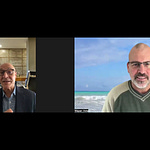“How can experienced professionals navigate today’s turbulent job market and turn a layoff or furlough into a positive career transition?”
This is the question that we posed to Tracy Dawson, an executive search recruiter in South Africa who’s helped place senior leaders across multiple sectors on the Continent.
In the video above, Tracy explains how executive search really works—and what job seekers can do to navigate the process with clarity, confidence, and strategy. Her key point: You don’t need 100 recruiters. You need one conversation with the right person.
Be thoughtful. Be helpful. Be clear about what you offer. Because in executive search, the best opportunities rarely go to those who apply—they go to those who are recommended by others.
Here’s the distilled wisdom for job seekers in senior roles who are looking to make their next move a smart one.
Bonus: Tuesday Webinar on Executive Search
RSVP Now to join us on Tuesday for How Executive Search works in the USA with Derek Wilkinson, a Partner at Odgers Berndtson, an executive search firm. He leads the US and Global Public & Not-for-Profit Practice.
What Executive Search Firms Do for Organizations
Let’s start with a key truth: Executive search firms don’t work for job seekers. They work for the client—the organization with a high-stakes role to fill.
Executive search firms are hired when a company needs a very specific skill set to solve a complex, often urgent, organizational challenge. These roles are usually:
Senior management or executive-level
Technically complex or highly specialized
Tied to governance, board approval, or major strategic change
Do not expect an executive recruiter to find you a job. They’re scanning the landscape for a perfect match to a specific client need—and if that’s you, they’ll call you.
How to Be Visible to Executive Search Firms
There are three ways for a recruiter to learn about your value and engage you to fill a high-profile or senior-level role they are seeking to fill.
Clarify your value proposition. What’s the one job you’d be perfect for? What sector and function are you strongest in? Think sectoral + functional + metric-driven match.
Explain your experience clearly. If your former organization isn’t widely known, write a short description: What did the organization do? How large was it? What results did you deliver?
Show both on LinkedIn. Yes, it really does matter. It is the prime research tool for recruiters, and there is a way to showcase yourself so that these two points above motivate the recruiter to call you.
One meaningful conversation with a recruiter can put you on the radar for every consultant in their firm. But how to stay top of mind? Be sure to offer value. If you’re not the right fit, be sure to recommend someone who is.
Age Discrimination is Real: Don’t Hide, Reframe
Yes, ageism is real, but hiding your seniority isn’t the solution. Instead you can follow the 7 steps to stay relevant - at any age, that we discussed previously.
Key is to remember that employers really are looking for candidates who can deliver results, and age is far less important than your ability to showcase your skills, adaptability, and enthusiasm for the role.
Look for roles aligned to your experience level
Find organizations that value senior talent (startups often do!)
Highlight your track record of impact, not your decades in service
It's important to remember that no one knows how old you are. Recruiters typically scan resumes for about 30 seconds. They don’t have the time or inclination to calculate your age.
You should also use your experience to your advantage.
“Every startup needs a 50-year-old,” says Tracy. And she’s right.
Your maturity is an asset—especially when you bring stability, insight, and networks to younger organizations.
Do Not be Overqualified for the Role
Many experienced professionals apply for roles that appear beneath their capabilities—roles they could do, but don’t really want to do. Hiring managers can sense this. Recruiters can see this, and it is an immediate “no” from both. Tracy explains why:
“If you could do a bigger, better job, the employer worries: what happens when that ideal role opens in six months?”
We all know what will happen. You will leave this job for that one. The recruiter will have to start the search all over again, this time with an angry hiring manager. They don’t want that experience… again.
Overqualified candidates may also face the prospect of reporting to less experienced managers—a potential source of internal tension. You may be fine reporting to a younger person, but will they be able to manage you?
If you’re aiming for a role that’s a step down, be sure to explain why it aligns with your current goals long before the recruiter sees your resume. Best is to network into the organization before a role is advertised, and explain your move to the hiring manager or someone who can influence them.
Networking Is Still Your Best Action
Again and again, all the research shows that networking is the best way to find a new job that you love. It’s even more important for senior-level leaders. Most roles at the executive level are never advertised. They are filled:
Through word of mouth - be on the tip of their tongue via networking
Via board-level referrals - network with those on boards today
Through executive search - befriend recruiters before they need you
If you want to be considered for these hidden roles, you need to be engaging with decision makers before they have a need. Best is to:
Be in conversation with those around the boardroom table
Join industry forums, attend events, share your insights
Refer good candidates to recruiters—even if a job isn’t right for you, stay helpful and visible
How to network effectively?
Paying Career Pivot subscribers can join us next Thursday, April 24th, for a special Ask Me Anything with Beth Granger, who will teach us How to Take the “Ick” out of LinkedIn Networking.
Executive Search is Playing the Long Game
Executive-level searches take time—sometimes up to 12 months, especially when roles require board approval. While you wait, you can consider short-term roles:












